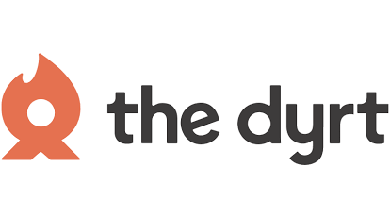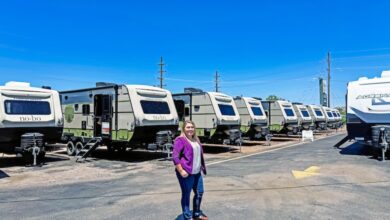Dealer Finds Specializing Pays Off
Owner Derek Bryant of Campers Union in North Carolina turns his passion for going off-grid into a creative dealership model.
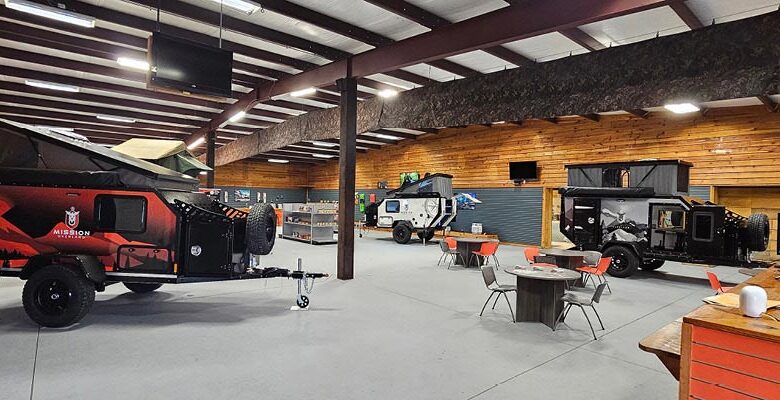
Many dealerships abide by a list of rules, some written and some unwritten, but Campers Union isn’t most dealerships.
The store, located just outside of Goldsboro, North Carolina, isn’t open six days a week (it’s closed Sunday and Monday). It isn’t offering anything that can’t be towed behind a half-ton truck (think lightweight adventure trailers). It isn’t even located on a busy road (try a cul-de-sac). Yet, for the things Campers Union isn’t, there’s a lot of things it is, says owner Derek Bryant, whose young business only opened late last year.
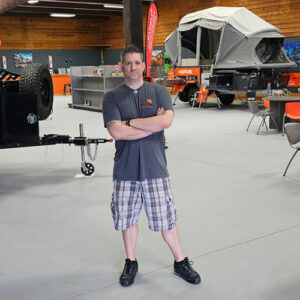
“The concept was not to be just a place to go buy campers,” he says. “We’ve got a full-service shop where we do overland builds, lifts, suspension systems, airbags, wheels and tires, roof racks, rooftop tents, as well as the capability of doing some more off-grid type setups. We do a ton of solar work, DC-to-DC charging inverters, massive lithium power banks, things like that. We really want to be the one-stop shop for off-roading, overlanding and off-grid builds.”
Bryant, who’s built and raced cars and trucks for most of his life, definitely isn’t risk-adverse, but starting such a unique business was tough.
“I chose a time to open a camper dealership where there was a record number of dealers going out of business. A lot of them made a lot of inventory mistakes and were just overwhelmed at the end of ’22 and into ’23 when the interest rates went up. Curtailments and interest were killing them,” he says. “Meanwhile, I came bopping out and said, ‘Hey, I want to open a new store.’ As you can expect, banks were not exactly thrilled or behind me on that idea.”
Thankfully, Bryant, a Colorado native who relocated to the Tarheel State almost 25 years ago, wasn’t new to the industry. Previously employed by an RV dealer group for four years following more than two decades in automotive aftermarket performance, he built relationships that allowed him to secure two small floorplans — one for new units, one for used. Pouring his savings into Campers Union was a decision he based partly on numbers.
“About a year before I left, I really started digging into the metrics of the overland side of things. I did this a lot when I was with Turbonetics. One of the biggest trend indicators is when you start seeing large manufacturers in the auto world making brand- or model-specific vehicles that cater to a certain market,” Bryant says. “They’ve got millions of dollars in research and development that we don’t have access to, so you can see when Toyota starts making an overland model or they really start pushing their TRD Pro stuff and when Nissan really starts pushing their Frontier PRO-4Xs and starts touting winches and lifts, you begin to see the trends from the top down.”
Investing in a Personal Passion
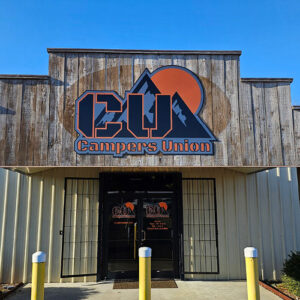
Emotion clearly was the other part of Bryant’s decision to strike out on his own.
“The idea of going to an RV park was never really appealing to me, but the idea of being able to get out there and hit trails and camp under the stars, like I did when I was a kid, was,” he says. “We would just drive up into the Rockies, and we’d find a couple of spots that were the emergency runoffs for trucks when you’re up in the mountains. My buddy had a Suzuki Samurai, my other buddy had an Isuzu Amigo, and we would just drive up those runoffs. There was a couple we had found trails on, and they were just nowhere. I mean, it’s just land out there, and we would randomly take trips where we’d grab tents and go. Being away from the city and seeing the stars and kind of being off-grid, which wasn’t a thing back then, resonated with me ever since.”
That’s why Campers Union stocks units from Ember RV, Forest River’s IBEX, OPUS Camper USA, TAXA Outdoors and, since January, Mission Overland. Bryant not only likes and uses them, but also believes they deserve a proper setting.
“Many of these manufacturers are represented on plenty of RV lots, but they’re never the main focus,” Bryant says. “We like putting them face forward. We like saying, ‘No, this is exactly what we do.’ We want people to beat on these things. We want them to take them on trails. We want to find out what breaks so we can upgrade and make them better. We resonate better with that customer. So, when it comes to choosing the inventory, it’s not just about what I would like being an enthusiast, but what I think is going to be quality for my customers, the brands that are going to work with me, plus hear my feedback and listen to the feedback of the customers and grow with us.”
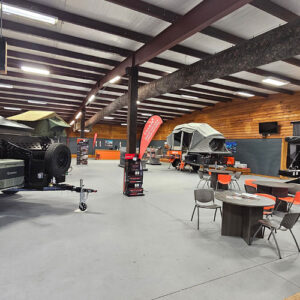
And the dealership definitely is growing — from when the doors opened in mid-August to the end of 2023, Campers Union sold 25 units. This year, sales already reached the low 30s by early May. He’s able to keep 30 to 35 units in stock, and that number is increasing daily. Like most dealers, Bryant carefully chooses his inventory.
“The downside, I suppose, to the smaller manufacturers, is they don’t have the difference in floorplans; most of these companies carry three to four to five. Obviously, IBEX and Ember have a few more than that, for sure, but we’re trying to keep it relatively spread out and fair amongst what we carry,” he says. “We’re a little bit limited by the companies that we do focus on, but it’s also nice, too, because we get more intimately acquainted with each of the models and know them better individually.”
One thing that doesn’t keep Bryant up at night, at least for now, is space. In June 2023, he leased a 30,000-square-foot building on a gated 6-acre tract in a cul-de-sac northwest of town. The structure, formerly home to a gun shop and indoor shooting range, is roughly divided in half and mostly open space. One side contains the showroom and parts store while the other side houses Bryant’s service department, complete with carpet and air conditioning. Each side can comfortably accommodate 10 to 12 units.
Wearing Many Hats
What does keep Bryant concerned is staffing. He has six employees and could use a few more, especially sales staff and technicians.
“I originally started this plan about February of last year, but the first place that I found fell through,” he says. “So, it took a little bit longer to get open than we had anticipated, and by the time we opened in August, we were already moving into the end of the season. Everyone was in their new model changeover, so there wasn’t a lot of inventory out there.”
Consequently, some of his first employees chose to leave for greener pastures, a situation Bryant, himself a husband and father, fully understood. He’s slowly rebuilding his team and even though he’s got a sales and finance manager, as well as managers over parts and service, they join forces when necessary.
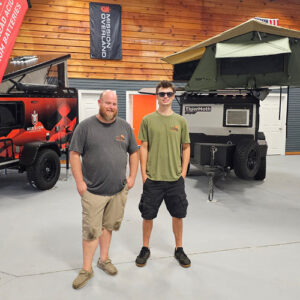
“It’s not uncommon for me, my parts guy and my service guy to be installing whatever we need. We just did a full off-grid build on a customer’s unit recently before they headed out to Moab,” he says. “We put full solar, a full lithium power bank, all sorts of stuff on there. We put some rear bags on his Jeep — the full gamut. We all pitched in. Some days, I’m detailing campers, some days I’m having interviews or talking to new potential employees, some days, I’m selling campers — I’m doing whatever I can to help out.”
Bryant uses an hourly pay structure in his shop, something he believes is more fair than the flat-rate system used by his previous employer, because he wants his techs to have more freedom when diagnosing issues and creating better solutions.
“With flat rate, you can lose some of that because it becomes more about the work you can turn and burn versus really putting your best foot forward, so if we manage it and plan it right, they’ll care about their work and I don’t really need to push them to make the hours,” he says. “If I hire the right person, they’ll be doing the job I want them to do anyway, regardless, and I’d much rather pay everyone what they’re worth.”
A Team Mentality
He’s adamant about ensuring Campers Union doesn’t have an “island feel” among the departments.
“The island feel is when the service guys stick with the service guys, the parts guys stick with the parts guys, the sales guys stick with the sales guys and everybody hates each other,” Bryant says. “Cohesion is definitely one of the things we preach here. Both my service and parts managers share the same counter — we all pitch in. Everybody’s got input because I feel like if we can’t get along, that’s going to be conveyed to the customer almost instantaneously.”
When Bryant created his concept, he wanted Campers Union to be a mashup of retailers 4 Wheel Parts and REI, as well as an RV dealership. That’s why, in addition to selling trailers and doing automotive work, he stocks rooftop tents, roof racks, lithium batteries and other items not found in many RV parts stores.
“It’s amazing how many dealers in the RV business that I’ve met that just absolutely detest parts and service,” he says. “I think being diversified in what you can offer not only strengthens the base of your company but strengthens it for your customer base. If you can do more for your customer, they’re more likely to come to you and trust you on more things. You help build a better name that way.”
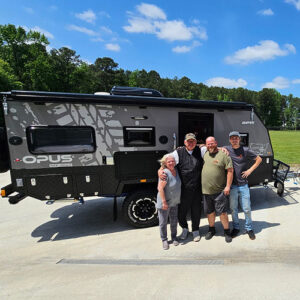
Bryant’s priorities since opening was straightforward: build RV sales first and then concentrate on modifying tow vehicles, but he’s had to change his plan.
“We’re now focusing heavily on more of the parts upgrades for the RVs. We’re averaging about a $5,000 upgrade on just about every unit we sell because they’re so planned out. Our customers are happy to see that we carry Battle Born, Canbat, Renogy and Victron batteries because these [are] companies they’ve seen on other campers or they’ve been doing research on.
“The fact is we have them here when no one else even remotely close to us has this stuff. It gives them a more hands-on feel with it. It lets them explore it a little bit more and be more involved in it,” he says. “The populace is telling us there’s an underserved market.”
About half his customers already have an idea of what they want while the other half are upsold during walkthroughs, Bryant says. He also makes sure customers receive plenty of free swag, too. Besides stickers and trucker hats, they also get candles from his mother’s candle company that contain a special beeswax with a higher melting point to survive life in an RV.
With Campers Union nearing its first anniversary, Bryant plans on a renegotiated floorplan double his present amount. That’ll allow him to get closer to stocking 50 units or so and move about 15 to 20 a month.
“The idea is not to get so big that we fall back into the same dealership patterns. I feel like, in order to stay a little bit more intimate, a little bit more connected with our customers, we need the time to upgrade and work on these things far more than you do on a regular RV,” he says.
Ultimately, if Campers Union takes off as Bryant intends, the concept will move beyond Goldsboro.
“Our five-year plan is to get two to three stores put together where we have everything dialed in down pat, and we can use our buying power for all our parts and our manufacturer experience to help make this a franchisable opportunity,” he says. “From day one, it’s always been about a repeatable process that we can take this underserved market and find another underserved market just like it.”

